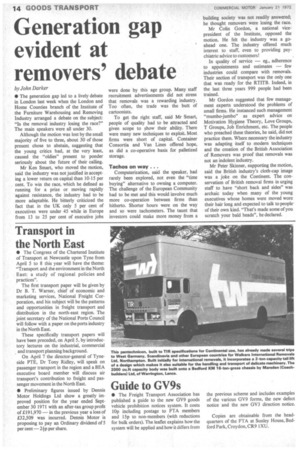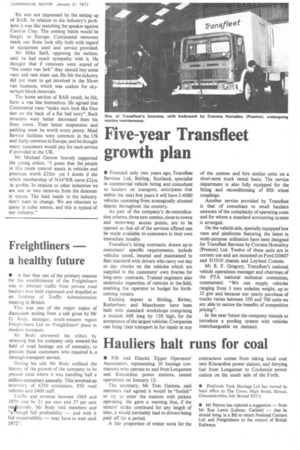Generation gap evident at removers' debate
Page 16

Page 17

If you've noticed an error in this article please click here to report it so we can fix it.
by John Darker
• The generation gap led to a lively debate in London last week when the London and Home Counties branch of the Institute of the Furniture Warehousing and Removing Industry arranged a debate on the subject: "Is the removal industry losing the race?" The main speakers were all under 30.
Although the motion was lost by the small majority of five to three, about 30 of those present chose to abstain, suggesting that the young critics had, at the very least, caused the "oldies" present to ponder seriously about the future of their calling.
Mr Ken Smart, who moved the motion, said the industry was not justified in accepting a lower return on capital than 10-15 per cent. To win the race, which he defined as running for a prize or moving rapidly against resistance, the industry had to be more adaptable. He bitterly criticized the fact that in the UK only 5 per cent of executives were under 45 while in Europe from 13 to 25 per cent of executive jobs were done by this age group. Many staff recruitment advertisements did not stress that removals was a rewarding industry. Too often, the trade was the butt of cartoonists.
To get the right staff, said Mr Smart, people of quality had to be attracted and given scope to show their ability. There were many new techniques to exploit. Most firms were short of capital. Container Consortia and Van Lines offered hope, as did a co-operative basis for palletized storage.
Tachos on way . . .
Computerization, said the speaker, had rarely been explored, not even the "time buying" alternative to owning a computer. The challenge of the European Community had to be met and this would involve much more co-operation between firms than hitherto. Shorter hours were on the way and so were tachometers. The taunt that investors could make more money from a building society was not readily answered; he thought removers were losing the race.
Mr Colin Gordon, a national vicepresident of the Institute, opposed the motion. He felt the industry was a goahead one. The industry offered much interest to staff, even to providing psychiatric advice to customers!
In quality of service — eg., adherence to appointments and estimates — few industries could compare with removals. Their section of transport was the only one that was ready for the RTITB. Indeed, in the last three years 999 people had been trained.
Mr Gordon suggested that few management experts understood the problems of small firms. He instanced such management "mumbo-jumbo" as expert advice on Motivation Hygiene Theory, Love Groups, T Groups, Job Enrichment, etc. The people who preached these theories, he said, did not practice them. Where necessary the industry was adapting itself to modern techniques and the creation of the British Association of Removers was proof that removals was not an indolent industry.
Mr Peter Skinner, supporting the motion, said the British industry's cloth-cap image was a joke on the Continent. The conservatism of British removal firms in urging staff to have "short back and sides" was archaic today when many of the young executives whose homes were moved wore their hair long and expected to talk to people' of their own kind. "That's made some of you scratch your bald heads", he declared. He was not impressed by the setting up of BAR. In relation to the industry's problems it was like matching the speaker against Cassius Clay. The coming battle would be fought in Europe. Continental removers made our firms look silly both with regard to equipment used and service provided.
Mr Mike Sari), opposing the motion, said he had much sympathy with it. He thought that if removers were scared of "the renter van lark" they should buy some vans and rent them out. He felt the industry did not want to get involved in the 30cwt van business, which was useless for skyscraper block removals.
The home section of BAR could, he felt, form a van line themselves. He agreed that Continental vans "make ours look like Oxo tins on the back of a flat bed lorry". Such invaders were better decorated than his front room. Their better suspension and padding must be worth every penny. Maid Service facilities were common in the US and fairly common in Europe, and he thought many customers would pay for such service if provided in the UK.
Mr Michael Gerson bravely supported the young critics. "I guess that the people in this room control assets in vehicles and premises worth £25m yet I doubt if the whole membership of NAFWR earns L24m in profits. In relation to other industries we are one or two removes from the dustmen in status. The bald heads in the industry don't want to change. We are reluctant to quote in cubic metres, and this is typical of our industry."










































































































